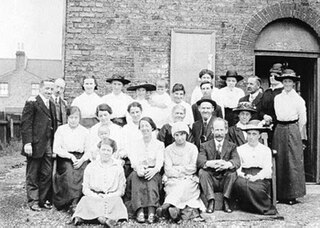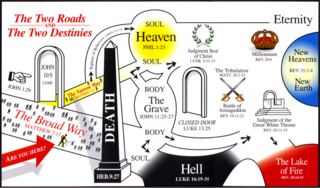Related Research Articles

The Plymouth Brethren or Assemblies of brethren are a conservative, low church, non-conformist, evangelical Christian movement whose history can be traced back to Dublin, Ireland, in the late 1820s, where they originated from Anglicanism. The group emphasizes sola scriptura, the belief that the Bible is the supreme authority for church doctrine and practice, over and above any other source of authority. Plymouth Brethren generally see themselves as a network of like-minded free churches, not as a Christian denomination.

The Uniting Church in Australia (UCA) was founded on 22 June 1977, when most congregations of the Methodist Church of Australasia, about two-thirds of the Presbyterian Church of Australia and almost all the churches of the Congregational Union of Australia united under the Basis of Union. According to the church, it had 243,000 members in 2018. In the 2016 census, about 870,200 Australians identified with the church; in the 2011 census, the figure was 1,065,796. The UCA is Australia's third-largest Christian denomination, behind the Catholic and the Anglican Churches. There are around 2,000 UCA congregations, and 2001 National Church Life Survey (NCLS) research indicated that average weekly attendance was about 10 per cent of census figures.

Restorationism is the belief that Christianity has been or should be restored along the lines of what is known about the apostolic early church, which restorationists see as the search for a purer and more ancient form of the religion. Fundamentally, "this vision seeks to correct faults or deficiencies by appealing to the primitive church as a normative model."

The Schwarzenau Brethren, the German Baptist Brethren, Dunkers, Dunkards, Tunkers, or simply the German Baptists, are an Anabaptist group that originally dissented from several Lutheran and Reformed churches that were officially established in some German-speaking states in western and southwestern parts of the Holy Roman Empire as a result of the Radical Pietist ferment of the late 17th and early 18th centuries.

Charis Fellowship, known before 2018 as the Fellowship of Grace Brethren Churches, and before 1976 under the name of National Fellowship of Brethren Churches, is a theologically conservative fellowship of Brethren churches that was founded in 1939 as a conservative split from the Brethren Church. The word charis is Greek in origin, meaning “grace.” The church traces its roots back to the Schwarzenau Brethren movement of Alexander Mack, founded in 1708 in Schwarzenau, Germany.
The emerging church is a Christian Protestant movement of the late 20th and early 21st centuries that crosses a number of theological boundaries: participants are variously described as Protestant, post-Protestant, evangelical, post-evangelical, liberal, post-liberal, conservative, post-conservative, anabaptist, reformed, charismatic, neocharismatic, and post-charismatic. Emerging churches can be found throughout the globe, predominantly in North America, Western Europe, Australia, New Zealand, and Africa.

Christian music is music that has been written to express either personal or a communal belief regarding Christian life and faith. Common themes of Christian music include praise, worship, penitence, and lament, and its forms vary widely across the world.

Peace churches are Christian churches, groups or communities advocating Christian pacifism or Biblical nonresistance. The term historic peace churches refers specifically only to three church groups among pacifist churches—Church of the Brethren; Religious Society of Friends (Quakers); and Mennonites, including the Amish, Old Order Mennonite, and Conservative Mennonites—and has been used since the first conference of the peace churches in Kansas in 1935.

The Exclusive Brethren are a subset of the Christian evangelical movement generally described as the Plymouth Brethren. They are distinguished from the Open Brethren from whom they separated in 1848.
Progressive Christianity is a "post-liberal movement" within Christianity "that seeks to reform the faith via the insights of post-modernism and a reclaiming of the truth beyond the verifiable historicity and factuality of the passages in the Bible by affirming the truths within the stories that may not have actually happened." Progressive Christianity represents a post-modern theological approach, and is not necessarily synonymous with progressive politics. It developed out of the Liberal Christianity of the modern era, which was rooted in enlightenment thinking.

The Indian Brethren are a Christian Evangelical premillennial religious movement. Although they have some distinct characteristics, they have a lot in common, in both doctrine and practice, with the international Open Brethren movement, with whom nearly all of them are historically affiliated.

The Kerala Brethren are a significant subset of the Indian Brethren, who are connected with the Open Brethren movement internationally. In the South Indian State of Kerala, four Syrian Christian (Nasrani) men who came from traditional churches were baptised in 1898, and many of the Kerala Brethren consider this event to have been the start of their movement. Some 600 of the 2,200 Brethren assemblies in India are located in Kerala.

The Gospel Halls are a group of independent Christian assemblies throughout the world that fellowship with each other through a set of shared Biblical doctrines and practices. Theologically, they are evangelical and dispensational. They are a conservative strand of the Open Brethren movement and tend to only collaborate with other assemblies when there is doctrinal agreement.
Edmund Hamer Broadbent was a Christian missionary and author. John Bjorlie wrote that he was a "tidy-looking English gentleman with a bookish side who discovered ways of slipping into and out of countries that others just assumed were 'closed doors.' He was not a big man, and his pleasant, easygoing manner would not have conjured in your mind the picture of the fearless missionary."

The United Church of Christ in the Philippines is a Christian denomination in the Philippines. Established in its present form in Malate, Manila, it resulted from the merger of the Evangelical Church of the Philippines, the Philippine Methodist Church, the Disciples of Christ, the United Evangelical Church and several independent congregations.

The Assemblies Jehovah Shammah are an Evangelical Christian network of churches that originated in India, which is still home to the great majority of them. The Evangelical publication Operation World estimates their numbers, as of 2010, at 310,000 adults and children in 910 assemblies, as their churches are generally known. Other sources estimate upwards of two thousand congregations, with a large presence in the State of Andhra Pradesh. The movement was founded in 1942 by evangelist Bakht Singh, whose theology and ecclesiology were much influenced by the Open Brethren. Although historically distinct from the Indian Brethren movement, which originated from missionary endeavours, the Assemblies Jehovah Shammah have a lot in common with it and are sometimes considered a part of the Brethren movement worldwide.
The Christian Brethren Church of New Zealand is the name by which churches in the Open Brethren movement in New Zealand are publicly known. It is not a denomination in the organizational sense, but a loose network of like-minded autonomous local churches, or "assemblies", as Brethren churches are generally known. According to the Evangelical publication, Operation World, there are 202 Brethren congregations in New Zealand with 16,164 in regular attendance. Some Brethren sources claim this number to be an underestimate, with internal surveys indicating as many as 38,000 adults and children attending Brethren assemblies — almost one percent of New Zealand's population.
The Open Brethren, sometimes called Christian Brethren, are a group of Evangelical Christian churches that arose in the late 1820s as part of the Assembly Movement. They originated in Ireland before spreading throughout the British Isles, and today they have an estimated 26,000 assemblies worldwide.
Brethren is a name adopted by a wide range of mainly Christian religious groups throughout history. The largest movements by this name are the Schwarzenau Brethren, Anabaptists, Moravian Brethren, and Plymouth Brethren.
References
- 1 2 "Find & Connect". Christian Brethren — Organization. Find & Connect Web Resource Project for the Commonwealth of Australia. Retrieved 6 June 2015.
- 1 2 3 Mandryk, Jason (2010), Operation World, Biblica Publishing, p. 118
- ↑ "CCCVaT - Christian Community Churches in Victoria and Tasmania". CCCVaT - Christian Community Churches in Victoria and Tasmania. Christian Community Churches of Australia.
- 1 2 3 Rowdon, Harold (2007). The Brethren Movement Worldwide. Lockerbie, United Kingdom: Opal Trust. pp. 10–13.
- ↑ "Stewards Foundation". stewardsfoundation.com.au. Stewards Foundation. Retrieved 6 June 2015.
- ↑ McQuoid, Stephen. "A Great Way to do Church". Perspectives. www.partnershipuk.org. p. 24. Retrieved 7 June 2015.
- ↑ "Access Ministries — Why it should concern everybody". www.greylining.com. greylining.com. Retrieved 7 June 2015.
- 1 2 Kohn, Rachael; Croucher, Roland. "The Christian Brethren". The Ark. The Ark. Retrieved 6 June 2015.
- ↑ Croucher, Roland. "Roland Croucher's Story". rolandcroucher.blogspot.co.nz. Roland Croucher. Retrieved 6 June 2015.
- ↑ Croucher, Roland. "Brethren: questions and some answers". John Mark Ministries. John Mark Ministries. Retrieved 6 June 2015.
- ↑ "April 2014". OSCC. Oldaker Street Christian Centre Inc. Archived from the original on 28 February 2015. Retrieved 7 June 2015.
- ↑ "CCC Aust". Craigmore Christian Church. Craigmore Christian Church. Archived from the original on 14 June 2015. Retrieved 6 June 2015.
- ↑ "Stewards Foundation". Stewards Foundation. Stewards Foundation. Retrieved 6 June 2015.